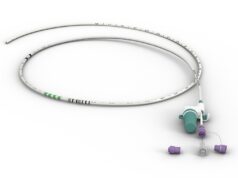
The largest real world study of Phagenyx, a form of Pharyngeal Electrical Stimulation (PES), was published in the journal EClinicalMedicine – The Lancet, and showed significant benefits for those suffering from neurogenic dysphagia.
The study, the Pharyngeal electrical stimulation for treatment of neurogenic Dysphagia European Registry (PHADER), was conducted on more than 255 patients from 14 countries, suffering with five different neurological conditions (stroke not needing ventilation; stroke needing ventilation; ventilation acquired; traumatic brain injury; other neurological causes). PES was administered to patients once daily for three days.
The study finds that treatment with PES was associated with an improvement in neurogenic dysphagia, and a reduced risk of aspiration. PES helped restore neurological control of swallowing. Patients were able to swallow safer, progress to a larger oral diet, have their feeding tubes removed and could be discharged from hospital.
Neurogenic dysphagia, affects up to 78% of stroke patients, delaying their recovery and can create increased chance of complications such as aspiration pneumonia or ICU readmission, which results in an in 13 times higher mortality.
Additionally, those patients with neurogenic dysphagia have a lessened quality of life due to reliance on feeding tubes and risk of malnutrition or dehydration. Neurogenic dysphagia can more than double the length of time patients remain in hospital after being released from the ICU.
Rainer Dziewas, Professor at the University of Munser and co-lead investigator on PHADER, Munster, Germany, commented: “These results are fascinating since most patients were treated in a chronic state of illness, where it is usually extremely difficult to achieve any treatment success. PHADER clearly suggests that PES may help even in this notoriously difficult situation. However, it is important to mention that patients with dysphagia should be treated as early as possible for best outcomes.”







